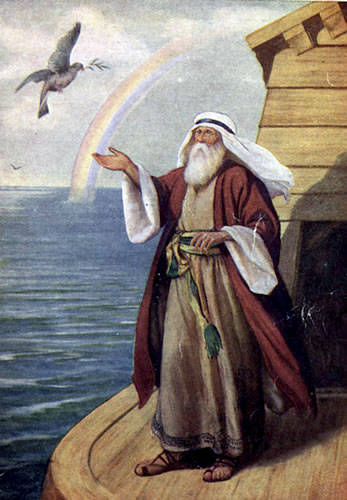THE RAVEN AND THE DOVE THE SEED
“Then he sent out a raven, which kept going to and fro until the waters had dried up from the earth. He also sent out from himself a dove, to see if the
waters had receded from the face of the ground.”
Genesis 8:7–8 (NKJV)
As Noah waited for the floodwaters to recede, he sent out two birds: a raven and a dove. The raven never returned, likely feeding on the remains left behind by the flood. But the dove, finding no resting place, returned to the ark. These two birds represent two distinct spiritual postures. The raven represents self-sufficiency and attachment to the remnants of a fallen world. It found satisfaction amidst destruction. The dove, on the other hand, symbolises peace, purity, and dependence on God. It refused to settle where there was no life and kept returning until it could bring back the sign of renewal; a fresh olive leaf. In our spiritual journey, we must choose between being content with worldly leftovers or
seeking new life in God’s presence. The dove teaches us to wait on God and desire what is holy and life-giving. In seasons of uncertainty, do you rely on your own strength, or do you return to God for direction, peace, and renewal? We should take a positive lesson from the dove.
BIBLE READING: Genesis 8:6–11
PRAYER: Lord, help me to be like the dove, always seeking Your presence and trusting in Your faithfulness. May I not settle in places that are not aligned with Your will. Lead me into the new beginnings You have prepared for me. Amen.
EYE IWO ATI EYELE IRUGBIN NAA
“Ó sì rán ẹyẹ ìwò kan jáde, ó sì ń lọ sẹ́yìn títí tí omi fi gbẹ lórí ilẹ̀, ó sì rán àdàbà kan jáde láti ara rẹ̀ lọ, láti wò ó bóyá omi náà ti gbẹ kúrò lórí ilẹ̀.” Jẹ́nẹ́sísì 8:7-8 .
Bí Nóà ṣe dúró dìgbà tí ìkún-omi yóò rọ, ó rán ẹyẹ méjì jáde: ẹyẹ ìwò àti àdàbà kan. Ìwò náà kò pa dà wá, ó sì ṣeé ṣe kó jẹ́ pé ó ń bọ́ àwọn tó ṣẹ́ kù tí ìkún- omi náà fi sílẹ̀ sẹ́yìn. Ṣùgbọ́n àdàbà náà kò rí ibi ìsinmi, ó padà sínú ọkọ̀. Awọn ẹyẹ meji wọnyi duro fun awọn iduro ti ẹmi meji ọtọtọ. Ẹyẹ naa duro fun itẹlọrun ara ẹni ati ifaramọ si awọn iyokù ti aye ti o ṣubu. O ri itelorun larin iparun. Àdàbà, ní ọwọ́ kejì, ṣàpẹẹrẹ àlàáfíà, mímọ́, àti ìgbẹ́kẹ̀lé Ọlọ́run. O kọ lati yanju nibiti ko si aye o si tun pada titi o fi le mu ami isọdọtun pada; ewe olifi tutu kan. Nínú ìrìnàjò ẹ̀mí wa, a gbọ́dọ̀ yàn láààrin ìtẹ́lọ́rùn pẹ̀lú àjẹkù ti ayé tàbí wíwá ìyè tuntun níwájú Ọlọ́run. Àdàbà ń kọ́ wa láti dúró de Ọlọ́run kí a sì máa fẹ́ ohun mímọ́ tí ó sì ń fúnni ní ìyè. Ni awọn akoko aidaniloju, ṣe o gbẹkẹle agbara tirẹ, tabi ṣe o pada si ọdọ Ọlọrun fun itọsọna, alaafia, ati isọdọtun? A yẹ ki o gba ẹkọ rere lati ọdọ adaba.
BIBELI KIKA: Jẹ́nẹ́sísì 8:6–11.ADURA: Oluwa, ran mi lowo lati dabi eye adaba, Ni gbogbo igba wiwa niwaju Re ati gbigbekele otito Re. Ki n ma bale si ibi ti ko ba ife Re mu. Mu mi lọ sinu awọn ibẹrẹ titun ti O ti pese sile fun mi. Amin.
